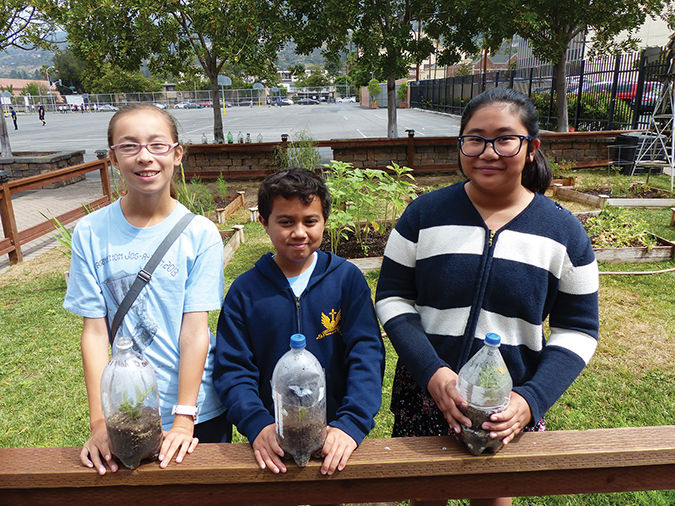The fourth grader ran to show his teacher the spring green insect he had just plucked from the plant bed, the first caterpillar ever found in the garden at Nativity School in El Monte.
Jenny Reyes and her class of 21 fourth grade students were in front of the school this May 22 morning, tending to six raised beds planted with snow peas, carrots, cucumbers and flowers.
A few students were fertilizing plants with “worm tea,” harvested from the 10,000 worms they care for in trays stacked for warmth between the front brick wall and the garden shed.
Sister of St. Louis Stacy Reineman, principal, started the garden five years ago, and it received a boost three years later when one of the school dads who happened to be a landscape architect offered to put in raised beds with decent soil.
"What comes out of the garden goes into the lunch program," explained Sister Reineman. "All of the unused [greens] go back into feeding the worms, and it's just a continuum. Everything has come together this year."
The school cook, who prepares a hot lunch every day, loves the fresh vegetables, according to the principal. "We'll announce it when we're serving" something from the garden, such as recent harvests of radishes, strawberries, broccoli, lettuce and cauliflower, noted Sister Reineman. "It gets fascinating what they're eating because it's coming out of the garden."
Between the garden and lectures by Reyes on "Healthy Eating" given to grades K-4 during electives week in March, the students know that eating lots of fruits and vegetables is good for their health, and also tasty.
"They love when they come out in the garden on Thursday mornings," said Reyes. "Many of my children have never had this [garden] experience. This is so wonderful for them; it's just amazing."
Part of the garden curriculum is teaching the children about water conservation during California's drought. At planting time, the students carefully anchor the hoses for the drip irrigation system that has been installed in each of the raised beds.
"The thing I like about the garden is you can get dirty and it helps the environment; the radishes I ate from here were delicious," said Joshua Udave.
"My favorite thing about the garden is it's a time where we can do what we want with the plants and care for them," shared fellow fourth grader Dylan Hernandez. "It's good because what we learn here we could plant anywhere, [like] our homes [or] volunteer places."
Outdoor science classroom
A year-and-a-half ago, Incarnation School in Glendale created a garden when a tree in the center of the grass patch on the asphalt playground fell over during a rare windstorm. Juana Salazar, science teacher, saw it as an opportunity for an outdoor science classroom/garden.
The project has taken off from the first two raised bed kits that the City of Glendale provided to the present garden of nine raised beds, one for each of the K-8 grades. Each bed contains herbs, flowers, fruits or vegetables, and students make scientific observations of the plants and insects living in the mini ecosystems.
"It has been such a powerful learning tool for my students," said Salazar. "The garden has helped the kids make real connections with the scientific topics we cover in class." Younger students use their five senses to practice inquiry skills while older students can observe biological principles they are learning about in class.
"Gregor Mendel (considered to be the Father of Genetics in the scientific community) planted pea seeds and made observations of their traits and, in the past, my seventh grade students could only see pictures of these traits," noted Salazar. "Now, they are able to identify and observe whether the pea plants [in the school garden] have inherited dominant or recessive traits."
"The most interesting thing about the garden for me was the cross-pollination," said seventh grader Matthew Conde. "It's like conducting another science experiment and it's fun doing these things. [Planting] is all new to me. I'm really happy and excited for the garden, and I can't wait for it to fully develop" with more crops and perhaps a bench for visitors inside the fenced enclosure, he added.
"We had a salad one time, and it was really nice," said fellow seventh grader Mila Mendoza, who especially liked eating the cherry tomatoes. "I really like having an outdoor science classroom. It's more fun and interactive for us, and it's a better experience."
"It's been a sort of a sense of responsibility that we've learned because we have to take care of the garden," said seventh grader Olive O'Beirne. "It means we can't forget like with other things. We have to make sure we're watering, otherwise we don't get to enjoy the fruits of our labor, like getting to eat the tomatoes or the peas."
"It's amazing how the garden really can entertain the students for a very long time," said Salazar. "It beats the worksheets and the paperwork that kids don't care for. I love it. It's been a dream of mine to have this outdoor classroom."

